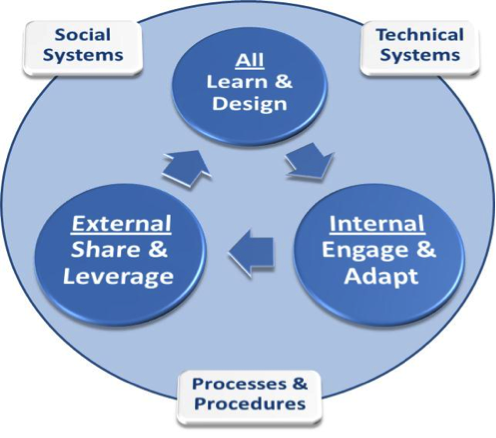Collaborative Learning for Innovation

Collaborative learning is a new enterprise-wide approach to performance improvement. It uses technical tools but is equally attentive to the interpersonal/social side of implementing change. Because the Keyte Group takes the time to guide broader, deeper technical and social learning, an organization gains not only process improvements but also the ability to manage the challenge of human factors surrounding fundamental change. By creating a community of inside innovators, the organization acquires sustainable new capacity for adapting to change.
Outcomes in a Health Care Environment
- 30% reduction in Length of Stay (LOS)
- 50% reduction in Left Without Being Seen (LWOBS)
- 92% drop in inpatient admissions for diabetic patients
- 63% improvement in patient satisfaction
- 90% reduction in physician interruptions
- Elimination of routine overtime
- Widespread improvement in leadership and teamwork
Outcomes in a Manufacturing Environment
- 90% reduction in production defects
- 30% reduction in time to market for new products
- 50% reduction in engineering hours for product development
- 60% improvement in customer satisfaction
- Elimination of overtime
- Widespread improvements in leadership, workforce engagement, and teamwork
We integrate learning internally (teams in the immediate environment) with learning externally (other teams across an organization or with external partnerships.) Using analytical techniques introduced by Keyte Group facilitator-advisors, hands-on staff observe, question, experiment with identifying problems and finding their solutions. They also share what they learn and engage in a collaborative refinement process. Each team engages first locally, and then more broadly with the other teams to exchange techniques, successes, and barriers related to the implementation of technical and social change efforts.
With a Keyte Group collaborative learning project, senior executives will:
- Address the biggest challenges and opportunities their organization faces
- Engage multiple teams to address different simultaneous improvements, accelerating learning while leveraging the project expense
- Keep valued staff and maximize their potential
- Ensure that operational changes and management systems are appropriately realigned
A typical collaborative project involves:
- Consultation with executive leaders to identify strategic issues, as well as staff to serve on project teams
- Small teams representing each of the functional areas/organizations relevant to the challenge or opportunity in question
- Two facilitator-advisors for each cohort of ten teams
- One day a month of guided workshop activities for the teams, over 6 to 9 months
- Specific assignments between workshops
- Regular updates, engagement, and strategic counsel for management
- Alignment of management systems and policies with changes in day-to-day operations
Contact Beau Keyte to learn more about how the Keyte Group can help you transform your organization.

